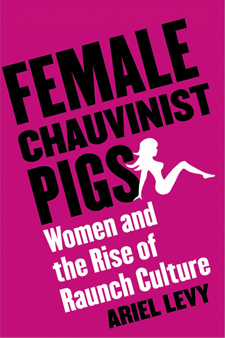The hot pink cover and provocative title misled me. Before reading Female Chauvinist Pigs: Women and the Rise of Raunch Culture I thought that I would share significant agreement with Levy, since I sympathise with feminism's cause in the fight against the objectification of women.
Levy provides a wide survey of this objectification of women; young women stripping and kissing each other in public so that they can score a hat and be seen on soft-core porn videos, ordinary career women taking pole dancing classes, reading Playboy, and patronising strip clubs and young girls dressing sexually provocatively " like porn stars.
These observations of widespread "raunchy" behaviour lead Levy to identify and label this cultural phenomenon as the raunch culture.
Christians would agree with Levy that raunch culture degrades women, and that its dominance in Western society is at best unhealthy and at worst dangerous. Yet Levy's views in general are a world apart from the Christian worldview.

The central part of the book is the adoption by women of the sex industry. When women are accused of degrading themselves by identifying with the sex industry in this way, they protest that they are actually being empowered. For a brief time a stripper has power over a man; he desires her, he pays her, but he cannot have her. Levy acknowledges that a woman might find this empowering.
However, the power that Raunch brings is limited and illusionary. Even if that power is lasting, the power is about women having sex not for pleasure but social status. Levy thinks that the essence of sexiness is not the image of a porn star or Paris Hilton, and the essence of sex is not power, but pleasure.
The poor structure of Female Chauvinist Pigs is the first reason why I hesitate to recommend it. The second reason is that Levy's writing style, although witty and "cool', borders on the sordid. She uses double entendres throughout her writing and her descriptions of the features of raunch culture are gratuitously sexually explicit. This may make some readers feel uncomfortable and impure, but it also suggests that Levy's argument is not powerful enough since it relies on such provocative language.
Levy also commits the cardinal sin in essay writing by introducing new material in the conclusion. This along with the uneven pace of the book and arguments left without conclusions suggest that Levy has, like many academics, completed her work in a hurry.
This would not be a problem if it was not so apparent that she had hunted around for an argument and conclusion after she decided what her book was all about. It is clear that she does not like to see women choosing to objectify themselves by embracing pornographic ways of presenting themselves. It seems that she has identified this intuitive feeling and constructed an argument to support this.
Why, according to Levy, is it wrong for women to reduce themselves to be mere sexual objects? Perhaps Levy has internalised Christian values, yet she has no basis on which to argue for them. Her argument against raunch culture seems to be based on her dislike of popular culture dictating sexual tastes, and what she sees as the degrading of sex; from sex being about pleasure to being about commodity and social status. These arguments are weak and underdeveloped.
Christianity offers more cohesive reasons for finding the widespread culture of raunch bad. Firstly, women should not be degraded by pornography (or anything else) because all people are made in the image of God.
Secondly, the dominance of Raunch culture means that objects of lust are everywhere, so that is difficult for the Christian to remain sexually pure.
While we ought to ask God to give us more self control, if we refuse to endorse this cultural phenomena (perhaps this refusal ought to include Christian women dressing modestly) we can help to eliminate its temptations.
Finally, raunch culture doesn't degrade sex as a pleasure to sex as a commodity, it degrades sex to only a pleasure and a commodity. Sex is a gift from God to be used, like all things, for his honour, not for our own selfish desires, whether they are power or pleasure.
Shiloh Isham lives in Melboune and has recently completed her doctorate in the arts.



























